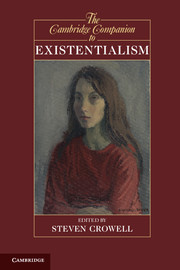Book contents
- Frontmatter
- I Introduction
- II Existentialism in Historical Perspective
- III Major Existentialist Philosophers
- 4 Kierkegaard’s single individual and the point of indirect communication
- 5 “What a monster then is man”: Pascal and Kierkegaard on being a contradictory self and what to do about it
- 6 Nietzsche: after the death of God
- 7 Nietzsche: selfhood, creativity, and philosophy
- 8 Heidegger: the existential analytic of Dasein
- 9 The antinomy of being: Heidegger’s critique of humanism
- 10 Sartre’s existentialism and the nature of consciousness
- 11 Political existentialism: the career of Sartre’s political thought
- 12 Simone de Beauvoir’s existentialism: freedom and ambiguity in the human world
- 13 Merleau-Ponty on body, flesh, and visibility
- IV The Reach of Existential Philosophy
- Bibliography
- Index
- OTHER VOLUMES IN THE SERIES OF CAMBRIDGE COMPANIONS
13 - Merleau-Ponty on body, flesh, and visibility
from III - Major Existentialist Philosophers
Published online by Cambridge University Press: 28 March 2012
- Frontmatter
- I Introduction
- II Existentialism in Historical Perspective
- III Major Existentialist Philosophers
- 4 Kierkegaard’s single individual and the point of indirect communication
- 5 “What a monster then is man”: Pascal and Kierkegaard on being a contradictory self and what to do about it
- 6 Nietzsche: after the death of God
- 7 Nietzsche: selfhood, creativity, and philosophy
- 8 Heidegger: the existential analytic of Dasein
- 9 The antinomy of being: Heidegger’s critique of humanism
- 10 Sartre’s existentialism and the nature of consciousness
- 11 Political existentialism: the career of Sartre’s political thought
- 12 Simone de Beauvoir’s existentialism: freedom and ambiguity in the human world
- 13 Merleau-Ponty on body, flesh, and visibility
- IV The Reach of Existential Philosophy
- Bibliography
- Index
- OTHER VOLUMES IN THE SERIES OF CAMBRIDGE COMPANIONS
Summary
The central inspiring theme of Merleau-Ponty's philosophical thought is, in a word, the body. It is difficult to state his core insight, however, without making it sound trivial. Everyone knows that we have bodies and that the body is essentially involved (somehow or other) in perception and action. But what does it mean to “have” a body, and how (exactly) is the body implicated in our experience and our behavior? What is its relation to us?
To begin with, notice how misleading it is to say that I “have” a body, as if my body stands in a merely external relation to me. Wittgenstein once wrote, “If someone says, ‘I have a body,’ he can be asked, ‘Who is speaking here with this mouth?’” Yet we also speak loosely (and harmlessly) of “having” minds, though it seems absurd to say that a mind is something distinct from the person whose mind it is. Especially under the influence of Descartes, or at least the popular appropriation of Cartesianism, we are probably more inclined to say that we are our minds. This is perhaps what we ought to say about the body, too, or at least what we ought to mean by saying that we have bodies: I don't merely have a body, I am my body. Even better, perhaps we ought to say that a body, like a mind, is an aspect of a person.
- Type
- Chapter
- Information
- The Cambridge Companion to Existentialism , pp. 274 - 288Publisher: Cambridge University PressPrint publication year: 2012
- 4
- Cited by

